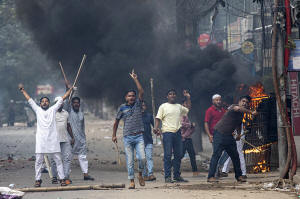Bangladesh struggles to contain the fallout of an uprising that toppled
its leader last year
[July 15, 2025]
By JULHAS ALAM
DHAKA, Bangladesh (AP) — Bangladesh was on the cusp of charting a new
beginning last year after its former Prime Minister Sheikh Hasina was
removed from power in a student-led uprising, ending her 15-year rule
and forcing her to flee to India.
As the head of a new interim government, Nobel Peace Prize laureate
Muhammad Yunus promised to hold a credible election to return to
democracy, initiate electoral and constitutional reforms and restore
peace on the streets after hundreds were killed in weeks of violence
that began on July 15, 2024.
A year later, the Yunus-led administration has struggled to contain the
fallout of the uprising. Bangladesh finds itself mired in a growing
political uncertainty, religious polarization and a challenging
law-and-order situation.
Here’s what to know about Bangladesh a year after the protests that
toppled Hasina.
Chaotic political landscape
Uncertainty about the future of democracy looms large in Bangladesh.
The student protesters who toppled Hasina formed a new political party,
promising to break the overwhelming influence of two major dynastic
political parties — the Bangladesh Nationalists Party, or BNP, and
Hasina’s Awami League.
But the party's opponents have accused it of being close to the Yunus-led
administration and creating chaos for political mileage by using state
institutions.
Meanwhile, Bangladesh's political landscape has further fragmented after
the country’s largest Islamist party, the Jamaat-e-Islami, returned to
politics more than a decade after it was suppressed by Hasina’s
government.

Aligned with the student-led party, it's trying to fill the vacuum left
by the Awami League, which was banned in May. Its leader, Hasina, is
facing trial for crimes against humanity. The strength of
Jamaat-e-Islami, which opposed Bangladesh's independence from Pakistan
in 1971, is unknown.
Both BNP and the Jamaat-e-Islami party are now at loggerheads over
establishing supremacy within the administration and judiciary, and even
university campuses.
They are also differing over the timing of a new parliamentary election.
Yunus has announced that the polls would be held in April next year, but
poor law and order situation and a lack of clear-cut political consensus
over it have created confusion. The chief of Bangladesh's military also
wanted an election in December this year — a stance Yunus didn't like.
“Post-revolution honeymoons often don’t last long, and Bangladesh is no
exception,” says Michael Kugelman, a Washington-based South Asia analyst
and senior fellow of Asia Pacific Foundation. “The interim government
faced massive expectations to restore democracy and prosperity. But this
is especially difficult to do as an unelected government without a
public mandate."
Yunus wants reforms before election
Yunus has delayed an election because he wants reforms — from changes to
the constitution and elections to the judiciary and police. Discussions
with political parties, except Hasina's Awami League, are ongoing.
Some of the reforms include putting a limit on how many times a person
can become the prime minister, introduction of a two-tier parliament,
and appointment of a chief justice.
There appears to be little consensus over some basic reforms. While both
the BNP and the Jamaat-e-Islami parties have agreed to some of them with
conditions, other proposals for basic constitutional reforms have become
a sticking point.
The Jamaat-e-Islami also wants to give the interim government more time
to complete reforms before heading into polls, while BNP has been
calling for an early election. The student-led party mostly follows the
pattern of the Jamaat-e-Islami party.
Kugelman says the issue of reforms was meant to unite the country, but
has instead become a flashpoint.
[to top of second column]
|

Students clash with police during a protest over the allocation of
government jobs, in Dhaka, Bangladesh, July 19, 2024. (AP Photo/Rajib
Dhar, File)

“There’s a divide between those that want to see through reforms and
give them more time, and those that feel it’s time to wrap things up
and focus on elections,” he says.
Human rights and the rise of Islamists
Human rights in Bangladesh have remained a serious concern under
Yunus.
Minority groups, especially Hindus, have blamed his administration
for failing to protect them adequately. The Bangladesh Hindu
Buddhist Christian Unity Council says minority Hindus and others
have been targeted in hundreds of attacks over the last year.
Hasina’s party has also blamed the interim government for arresting
tens of thousands of its supporters.
The Yunus-led administration denies these allegations.
Meenakshi Ganguly, deputy Asia director for Human Rights Watch, says
while the interim government has stopped enforced disappearances and
extrajudicial executions that had occurred under the Hasina
government, “there has been little progress on lasting security
sector reforms or to deliver on the pledge to create robust,
independent institutions.”
Meanwhile, Islamist factions — some of whom have proposed changes to
women’s rights and demanded introduction of Sharia law — are vying
for power. Many of them are planning to build alliances with bigger
parties like the BNP or the Jamaat-e-Islami.
Such factions have historically struggled to gain significant
electoral support despite Bangladesh being a Muslim majority, and
their rise is expected to further fragment the country's political
landscape.
Diplomatic pivot and balancing with global powers
During Hasina's 15-year rule, Bangladesh was India’s closest partner
in South Asia. After her ouster, the Yunus-led administration has
moved closer to China, which is India’s main rival in the region.
Yunus’ first state visit was to China in March, a trip that saw him
secure investments, loans and grants. On the other hand, India is
angered by the ousting of its old ally Hasina and hasn't responded
to Dhaka’s requests to extradite her. India stopped issuing visas to
Bangladeshis following Hasina's fall.

Globally, Yunus seems to have strong backing from the West and the
United Nations, and it appears Bangladesh will continue its foreign
policy, which has long tried to find a balance between multiple
foreign powers.
But Kugelman says the country's biggest challenge may be the “Trump
factor.”
In January, the Trump administration suspended USAID funds to
Bangladesh, which had sought significant levels of U.S. support
during a critical rebuild period post Hasina's ouster.
“Dhaka must now reframe its relations with an unconventional U.S.
administration that will largely view Bangladesh through a
commercial lens,” Kugelman says.
All contents © copyright 2025 Associated Press. All rights reserved |